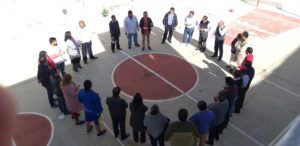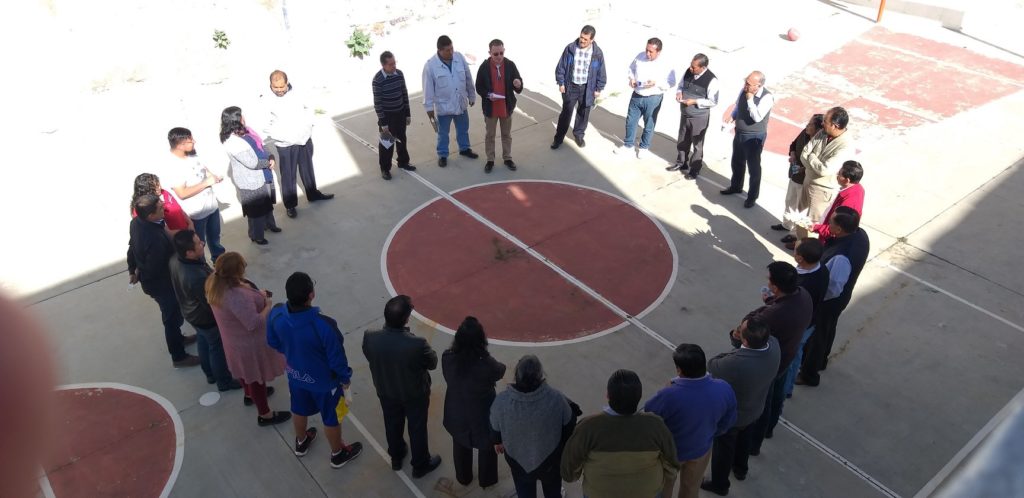Christian Leadership and Resilience: Accompaniment in the Recovery Processes
Cindy Moraga-Selva served the Theological Community of Mexico (CTdeM).
In recent months, we have witnessed the importance of pastoral accompaniment in times of anguish and hopelessness. Pastoral work has been challenged by various crises arising from the current pandemic and post-pandemic context. Multiple organizations that serve the churches and their communities are working on different initiatives to strengthen Christian leadership capacities in pastoral care and Diakonia.
The Theological Community of Mexico (Comunidad Teológica de México, CTdeM) offers a Certificate in Chaplainship and Pastoral Accompaniment. This academic course seeks to train and equip pastors and church leaders to develop more significant quality and professionalism in accompanying individuals, families, and communities in crisis. Likewise, Global Ministries, through its office for Latin America and the Caribbean, promotes workshops and spaces for reflection for the proper management of emotions in crisis contexts. As a result of these initiatives, we have managed to implement Virtual Circles for pastoral accompaniment, aimed primarily at Christian leadership that needs to be accompanied to continue accompanying others.
Christian leaders from various churches and places in Mexico have managed to participate in virtual spaces to strengthen their pastoral capacities. Uniquely, we have worked on the ability to listen to each other. Listening is one of the most important skills we can and must develop in times of crisis. It is also a challenging skill to learn. You have to practice over and over again. That is why, in this pandemic, we are learning to listen to each other through our stories of trauma and pain. Listening to accompany is the fundamental basis of the pastoral accompaniment that we want to promote to recover fully.

We listen to each other from pain and suffering. We recognize God’s acts throughout history. God is interested in what happens in the world. If God is present in our stories of trauma and pain, it is because God can understand our sufferings and suffers with us. Thus, the sufferings of the world are also those of God. Biblical-theological reflection to address the issue of human suffering has also been critical in these Virtual Circles. We have learned that grief is not to prove our faithfulness to God, nor is it a divine punishment. We suffer for being faithful to God in a chaotic world and when opposed to God’s plans. To accompany one another is to assume a clear choice for those who suffer, for the most vulnerable, just as the God of Exodus does.
In our Virtual Circles, we have also worked with a World Council of Churches document: Voices of Lament, Hope, and Encouragement. This document allowed us to establish links between Christian leadership and healing, resilience, and hope. Faced with the question, “how do we feel in this context of a pandemic?” many people responded: fatigued, distressed, and hopeless. Without a doubt, these emotions go beyond the physical level. We are also fatigued on emotional and spiritual levels. By listening to each other, we also accompany each other, and we heal the community. It is from koinonia (communion) that we can transform our lament into faith and hope, affirming with our compassionate acts that God hears and sustains our stories of trauma and pain.
We thank God for Global Ministries of the Christian Church (Disciples of Christ) and the United Church of Christ. Thanks to their commitment, we continue to accompany the churches in Mexico with formation and restoration initiatives in the current context of the pandemic. With the implementation of these initiatives, the churches recognize the following priority actions:
- We need to continue praying with our feet on the ground, listening to the cry of our communities to accompany them pastorally.
- It is crucial for us todiscern the times in which we live in the face of the complex repercussions of the pandemic. We have to open our eyes and ears wide to understand the signs of the present tense and hear God’s voice.
- We are called to raise the prophetic voice and fight for social justice. We must continue to stress the importance of all of us being cared for according to our needs, giving equal value to the lives of rich and poor. In the current pandemic context, no one is protected until we are all protected.
- It is our duty to accompany those who suffer from different types of grief. By accompanying, listening, and sustaining people in their trauma stories, we help them overcome pain and take care of their mental, physical, and spiritual health.
- Finally, we need to continue to lead by example and work for the unity of the church. Let us transform this crisis into an opportunity to create alliances of hope with other churches and organizations.
Liderazgo cristiano y resiliencia
Acompañándonos en nuestros procesos de recuperación.
En estos últimos meses hemos sido testigos de la importancia que tiene el acompañamiento pastoral en tiempos de angustia y desesperanza. Las personas encargadas de realizar la labor pastoral se han sentido desafiadas por diversas situaciones de crisis originadas por el actual contexto de pandemia y post pandemia. Diversas organizaciones que están al servicio de las iglesias y sus comunidades se encuentran trabajando en diversas iniciativas para fortalecer las capacidades del liderazgo cristiano en el campo de la pastoral y la diaconía.
La Comunidad Teológica de México sigue ofreciendo su diplomado de Capellanía y Acompañamiento Pastoral. Con esta oferta académica se busca capacitar y equipar a pastores, pastoras y lideres eclesiales para desarrollar con mayor calidad y profesionalismo la tarea de acompañar a personas, familias y comunidades en crisis. Así mismo, Ministerios Globales a través de su oficina para América Latina y el Caribe, esta promoviendo talleres y espacios de reflexión para el manejo adecuado de las emociones en contextos de crisis. Producto de estas iniciativas hemos logrado implementar Círculos Virtuales para el acompañamiento pastoral, dirigido especialmente al liderazgo cristiano que requiere ser acompañado para poder seguir acompañando.
Liderazgo cristiano de diversas iglesias y lugares de México han logrado participar de espacios virtuales para fortalecer sus capacidades pastorales. De manera especial hemos trabajado la habilidad de escucharnos. Escuchar es una de las habilidades más importantes que podemos y debemos desarrollar en tiempos de crisis. Es además una habilidad muy difícil de aprender. Hay que practicar una y otra vez. Por eso, en este tiempo de pandemia estamos aprendiendo a escucharnos unos a otros sosteniendo nuestras historias de trauma y dolor. Escuchar para acompañar es la base fundamental del acompañamiento pastoral que queremos promover para encaminarnos a una recuperación plena.

Nos escuchamos desde el dolor y el sufrimiento. Reconociendo el actuar de Dios en la historia. De un Dios interesado en lo que sucede en el mundo. Si Dios esta presente en nuestras historias de trauma y dolor, es porque Dios es capaz de comprender nuestros sufrimientos y de sufrir con nosotros. Es así, que los sufrimientos del mundo son también los de Dios. La reflexión bíblica – teológica para abordar el tema del sufrimiento humano también ha sido importante en estos Círculos Virtuales. Hemos aprendido que el sufrimiento no es para probar nuestra fidelidad a Dios, ni es un castigo divino. Sufrimos por ser fieles a Dios en un mundo caótico y opuesto a los planes de Dios. Acompañarnos unos a otros es asumir una opción clara por los que sufren, por los más vulnerables, igual que lo hace el Dios del éxodo.
En nuestros Círculos Virtuales también hemos trabajado con el documento del Consejo Mundial de Iglesias: Voces de lamento, esperanza y aliento. Este documento nos permitió establecer vínculos entre el liderazgo cristiano y la sanación, la resiliencia y la esperanza. Frente a la pregunta ¿Cómo nos sentimos en este contexto de pandemia? Muchas personas respondieron: fatigadas, angustiadas y desesperanzadas. Sin duda, estas emociones van más allá del nivel físico, estamos fatigados también a nivel emocional y espiritual. De esta manera al escucharnos y acompañarnos unos a otros comenzamos a sanar en comunidad. Es desde la koinonia (comunión) que podemos transformar nuestro lamento en fe y esperanza, afirmando con nuestros actos compasivos que Dios escucha y sostiene nuestras historias de trauma y dolor.
Damos gracias a Dios por los Ministerios Globales de las iglesias Discípulos de Cristo y Unida de Cristo, ya que gracias a su compromiso seguimos acompañando a las iglesias en México con iniciativas de formación y restauración en el actual contexto de pandemia. Con la implementación de estas iniciativas las iglesias reconocen como acciones prioritarias:
- La necesidad de seguir orando con los pies puestos en la tierra, escuchando el clamor de nuestras comunidades para acompañarlas pastoralmente.
- Discernir el tiempo que vivimos frente a las repercusiones complejas de la pandemia. Tenemos que abrir bien nuestros ojos y oídos para comprender los signos del tiempo presente y escuchar la voz de Dios.
- Elevar la voz profética, luchando por la justicia social. Hay que seguir insistiendo en la importancia de que todos seamos atendidos de acuerdo con nuestras necesidades, otorgando el mismo valor a las vidas de ricos y pobres. En el actual contexto de pandemia nadie está protegido hasta que todos estemos protegidos.
- Seguir acompañando a quienes están sufriendo por diferentes tipos de duelos. Al acompañar, escuchar y sostener a las personas en sus historias de trauma les ayudamos a superar el dolor y a cuidar de su salud mental, física y espiritual.
- Finalmente, necesitamos seguir predicando con el ejemplo y trabajando por la unidad de la iglesia. Transformemos esta crisis en una oportunidad para crear alianzas de esperanza con otras iglesias y organizaciones.
Cindy Moraga-Selva served the Theological Community of Mexico (CTdeM). Her appointment is made possible by your gifts to Disciples Mission Fund, Our Church’s Wider Mission, and your special gifts.

